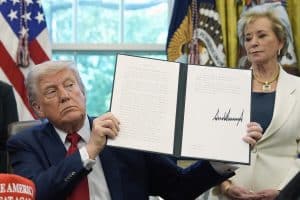Written by Kristen Thomason, Baptist News Global
The second night of the Republican National Convention focused on the party’s No. 1 issue — immigration. Donald Trump scuttled a bipartisan Senate bill on immigration and border security just so he could campaign on the immigration crisis at America’s southern border. And now, immigration permeates every plank of the Republican platform. Although anti-immigrant policies have become standard conservative talking points, like many things MAGA they are rooted in the racism and twisted theology of Christian nationalism.
Hierarchical nature of race’
“Because Christian nationalism is largely premised on the hierarchical nature of race, as a social construct, it is directly aligned with white supremacy. Christian nationalism is about the preservation of power that has historically belonged to white Protestants,” said Jay Augustine, senior pastor at St. Joseph AME Church, in Durham, N.C, and a member of the consulting faculty at Duke Divinity School.
A Public Religion Research Institute survey revealed that unlike most Americans, adherents of Christian nationalism have a negative view of immigrants. For example, 81% of white Christian nationalists believe in the Great Replacement Theory, a conspiracy promoted by far-right extremists who claim immigrants of color are invading primarily white countries and replacing their “cultural background” with an “ethnic one.”
As America has grown more diverse, tolerance for that diversity has waned among those who believe white Christians should be in charge.
“Christian nationalism seeks to preserve rather than share power. Its policies manifest in book bans, falsified talking points about Critical Race Theory, and voter suppression laws,” Augustine said. Trump’s second term agenda is yet another attempt to forcibly reverse these demographic changes.
Vought, Wolfe and Wolfe
Russ Vought is founder of the Center for Renewing America, an architect of the Heritage Foundation’s Project 2025 and Trump’s potential White House chief of staff. As a confidant who speaks regularly with the former president, he is the primary pipeline between Christian nationalism and Republican leadership. Vought also served as policy director for the GOP platform, a document which has historically guided the winning party’s future legislation and committee hearings. A leaked document from CRA listed Christian nationalism as a policy goal for the next Trump administration.
Vought’s beliefs are heavily influenced by Christian nationalist William Wolfe with whom he worked at Heritage Action, a conservative advocacy organization linked to the Heritage Foundation. William Wolfe was a senior official during the first Trump term and is the director of the Center for Baptist Leadership, a group concerned that the Southern Baptist Convention is too liberal.
Another associate of William Wolfe and Vought is author Stephen Wolfe, who wrote the bestselling book The Case for Christian Nationalism. With much less creativity than Plato’s Republic or Thomas Moore’s Utopia, Stephen Wolfe muses in his book on the ideal Christian nationalist state. In that America, citizens are organized by place and ethnicity, which he refers to as “volkgeist,” a sentiment similar to the foundational Nazi ideology of a racially pure “volk.”
With lofty language, Stephen Wolfe justifies what amounts to basic racism this way: If Adam and Eve had not sinned, humanity eventually would have organized itself into distinct homogenous nations. Therefore, the preference for being with those who are ethnically similar is a return to a pre-fall state and the “embodiment of the kingdom of God.”
To follow God, white Christian Americans are right to prioritize those most like themselves, he says.
For William Wolfe, multiculturalism as portrayed in Revelation 7:9 is not something to strive for on earth. It is a vision of God’s work in heaven among the elect. White churches and communities, therefore, should not be “guilted” into diversity, he says.
GOP platform problems
While the 2016 platform celebrated immigrants’ “vital contributions in every aspect of national life,” the 2024 GOP platform lacks any such complementary language. This time the party is prioritizing merit-based immigration, so long as immigrants contribute to the economy and are not a drain on public resources.
Stephen Wolfe adds these additional requirements: “If the guests (immigrants) are bad —lacking gratitude and humility, behaving arrogantly, flagrantly violating social norms or civil laws, showing a dominating spirit, etc. — the hosts can rescind legal residence and deport them. As guests, foreigners must comport themselves with respect for their hosts’ laws and customs.”
The norms and customs he has in mind are, of course, those held dear by conservative white Christian Protestants. Punitive action against those “behaving arrogantly” or possessing a “dominating spirit” skirts dangerously close to the coded adjective “uppity” of the Jim Crow era, an accusation punishable by lynching.
Seeing such subtexts in Stephen Wolfe’s language is reinforced by the company he keeps. Wolfe cohosts the Ars Politica podcast with white supremacist Thomas Achord. His publisher, Christian nationalist pastor Doug Wilson, is a self-described “paleo-Confederate.”
“In the eyes of some, any threat to God’s ‘original’ establishment of the hierarchy of America — including the inclusion of immigrants, minorities and non-Christians as part of America’s sociopolitical order — is antithetical to God’s intention for God’s ‘chosen nation,’” Jay Augustine warned.
Wolfe’s “volkgeist” is little more than a retread of the same toxic American exceptionalism that has, in the past, led to the genocide of Native American tribes, chattel slavery, Jim Crow and the Chinese Exclusion Act.
Forced assimilation
In the theocratic eyes of the Wolfes and Vought, those entering America must be prepared to assimilate.
“Illegal immigrants who refuse to learn English, instead forming communities and subcultures that mirror the home country as the same, that is the problem we face today,” Vought said.
But he doesn’t limit this requirement to just illegal immigrants. Even Afghan interpreters who’ve been promised U.S. visas should be asked “if they have any sense of the Judeo-Christian worldview this country was founded on,” he said. “That doesn’t mean we don’t give religious liberty, but it does mean are they wanting to come here and assimilate?”
Vought justifies this additional vetting by exalting ancient Israel, which welcomed migrants “so long as they accepted Israel’s God, laws and understanding of history.”
The GOP platform requires migrants to “love America” and promises to “use existing federal law to keep foreign Christian-hating communists, Marxists, and socialists out of America” along with “jihadists and jihadist sympathizers.”
The latter, according to the Southern Poverty Law Center, is thinly veiled anti-Muslim hate speech, which isn’t surprising coming from the party that plans to reinstate Trump’s 2017 Muslim travel ban.
Fear
Christian nationalism thrives on fear, insecurity and hate. By casting illegal immigrants as criminals, child traffickers and drug dealers, Trump continues to fan the flames of fear in his followers. The GOP convention made much of “migrant crime” terrorizing the country, when, in fact, violent crime in all demographic sectors has declined since 2020.
Trump claims immigrants are “poisoning the blood of our country,” a possible allusion to Adolf Hitler’s writings in Mein Kampf where “blood” is a metaphor for the purity of the “volk.”
The former president has expanded the Great Replacement Theory to include the right-wing conspiracy that Biden is allowing illegal immigrants to enter the U.S. specifically to replace Trump’s voters with his own. He calls illegal immigrants “blood thirsty savages,” “animals” and “not people.” This dehumanizing language legitimizes the inhumane treatment of immigrants.
“Since (white) Christian nationalism also places minorities (racial and religious) and immigrants in a hierarchical space that is premised on white supremacy, its xenophobia and ‘Otherism’ manifest in anti-immigrant politics and policies,” Augustine warns.
Trump promised attendees at a Miami rally that “the moment I lift my hand from the Bible after taking the oath of office, we’re going to do it. On day one we will begin the largest deportation operation in the history of our operation.”
He said he will model this massive undertaking after a similar mass deportation during the Eisenhower administration targeting illegal Mexican immigrants. That expulsion used fear tactics and a military-style campaign, which included concentration camps and forced marches through the desert.
Also on “day one,” Trump said he will issue an executive order to suspend passports, Social Security numbers and government benefits for the children of undocumented immigrants — thereby ending birthright citizenship. While this is currently unconstitutional, a conservative Supreme Court could make it happen.
Trump and his allies also plan to suspend the nation’s refugee program, end DACA and imprison 10 million undocumented immigrants in militarized detention camps. The Flores settlement prevents the government from detaining children indefinitely in such internment camps, but Stephen Miller confirms a second Trump administration will appeal this rule to the Supreme Court as well.
Trump also is considering a return of the child separation policy, something Vought supports: “The decision to defend the rule of law necessitates separation of families — not unlike when a parent commits a crime and goes to jail.”
‘Obey the government’
During the first Trump administration, Attorney General Jeff Sessions defended the child separation policy using Paul’s admonition in Romans 13 to obey the government. But even conservative evangelicals like Russell Moore and Franklin Graham thought the policy was “disgraceful.” (Nevertheless, Graham endorsed Trump at the 2024 convention.)
Vought says failure to enforce border laws “perverts God’s standard of justice” and faith leaders like Graham who disagree are “weak.”
“We are overrun with sentimentalism and category confusion,” Vought says. “A verse like Matthew 25:35 ‘For I was hungry, and you gave me something to eat, I was thirsty and you gave me something to drink, I was a stranger and you invited me in,’ has become a metaethical starting point for a compassion to a disembodied neighbor above all other considerations such as justice.”
Only once the needs of the nation — the “volkgeist” — are met should the United States consider helping noncitizens, this philosophy says.
“Generosity must be understood as giving from what is leftover — or what I will call ‘surplus resources.’ Accordingly, proper generosity is the giving only of one’s surplus resources to the right person at the right time in the right manner,” says Stephen Wolfe.
This argument stands in direct opposition to Jesus’ parables of the rich young ruler (Mark 10: 17-27), the rich fool (Luke 12:16-21) and his commendation of the widow who gave her only two coins (Luke 21:1-4). In fact, Christian nationalism largely sidelines the teachings of Jesus Christ.
Jay Augustine is not surprised.
“Jesus focused on human commonality instead of socially constructed divisions,” he said. “It is therefore understandable that Christian nationalism omits Jesus. It’s a cultural framework that is antithetical to Jesus’s teachings of human equality.”
“Securing borders, punishing illegal immigrants, ending sanctuary cities, mass deportation of illegal immigrants, ensuring that no tax dollars collected by American citizens go to fund services to illegal immigrants. (These) should be top priorities for all Christian-based immigration policies,” Vought says.
In fact, he suggests the United States halt immigration altogether. “We need to have an assessment whether legal immigration is healthy where we are right now as a country. We are in the midst of a cold civil war.”
In his opinion, immigration sows division not only through the different cultural, religious and linguistic differences of immigrants, but also through the differences of opinion espoused on the subject by American citizens.
‘Not a global passport’
When people on X confront William Wolfe about deporting immigrants who are “made in the image of God” or “children of God” or “revitalizing Christianity” in the U.S., he is unmoved, saying: “Being a child of God is not a global passport,” and “The Great Commission does not require Christians to commit national suicide through mass immigration.”
Vought also is familiar with appeals from believers who do not support Christian nationalism. “The argument goes that, ‘If people are made in the image of God and they want to escape a harmful living situation and some economist says we need cheap labor, then you must have a reason to oppose immigration, you must be a racist.’”
In short, the elaborate framework Christian nationalists have constructed to rationalize their biases and grievances is impervious to such empathetic, Christ-like, humanity-based appeals. Like the segregationists and eugenicists before them, they cloak their cause in the language of theology and social science in an elaborate attempt to legitimize ignoring the most basic tenet of Christianity: “Love your neighbor as yourself.”
Like the lawyer who tested Jesus in Luke 10, Christian nationalists try to justify themselves by narrowly defining “neighbor” as someone of a similar race, religion, and culture. They prioritize the law over compassion.
Jesus’ parable of the Good Samaritan provides a different answer. The true neighbor to the man left for dead, and the example Christ says we are to follow, is the Samaritan man who was merciful.
Controversial Idaho pastor Doug Wilson, pastor and paleo-Confederate, counters that the story of the Good Samaritan applies only to neighbors, not nations.
But as always, Jesus is not that easily dismissed. He intentionally casts the Samaritan as the parable’s protagonist knowing full well the ethnic and religious divisions between the Jews and Samaritans. As Jay Augustine points out, “Luke’s parable of the Good Samaritan shows Jesus rebuked the racial and ethnic hierarchy of his day, embracing instead full social equality. Jesus focused on human commonality, instead of socially constructed divisions.”
Augustine offers this strategy to Christians who care about immigration: “The xenophobia of Christian nationalism must be combatted with a faith-based ethic of welcome and resistance.”
This article was originally published at Baptist News Global, a reader-supported, independent news organization providing original and curated news, opinion and analysis about matters of faith. You can sign up for their newsletter here. Republished with permission.
Kristen Thomason is a freelance writer with a background in media studies and production. She has worked with national and international religious organizations and for public television. Currently based in Scotland, she has organized worship arts at churches in Metro D.C. and Toronto. In addition to writing for Baptist News Global, Kristen blogs on matters of faith and social justice at viaexmachina.com.






